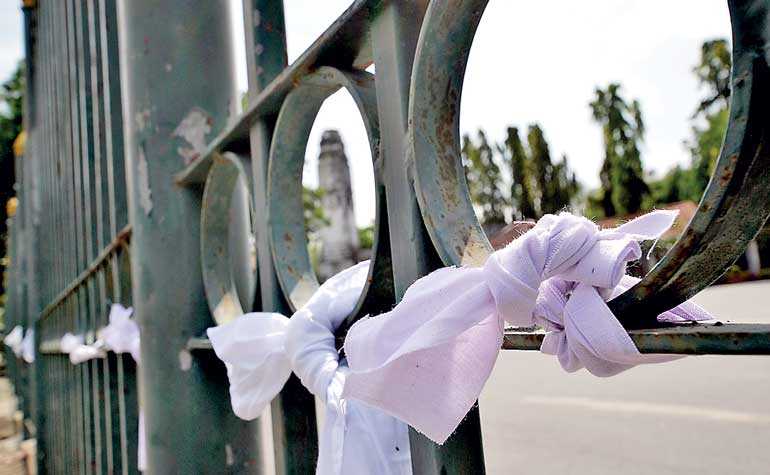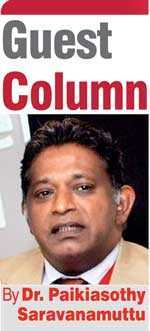Monday Feb 16, 2026
Monday Feb 16, 2026
Tuesday, 23 February 2021 00:00 - - {{hitsCtrl.values.hits}}

Did and does the Rajapaksa regime take into account the impact of its blatantly racist policy on the burial/cremation controversy, in defiance of international and national scientific evidence, on the deliberations and potential outcome of the Geneva sessions? – Pic by Shehan Gunasekara
 Foreign policy is essentially about how a country represents itself and pursues its interests in the international realm and how this plays out domestically. Influencing policy are domestic factors as well as international dynamics leading to the argument that foreign policy is ‘intermestic’ – a term now used in international relations literature to capture the true nature and essence of foreign policy.
Foreign policy is essentially about how a country represents itself and pursues its interests in the international realm and how this plays out domestically. Influencing policy are domestic factors as well as international dynamics leading to the argument that foreign policy is ‘intermestic’ – a term now used in international relations literature to capture the true nature and essence of foreign policy.
Foreign policy must reflect the values and aspirations of the country and when hard choices have to be made in terms of ensuring an international environment that facilitates this, government must be bold and take the lead domestically to inform the public as to the reasons and the realities of international politics and garner a domestic coalition of support behind it. The intermestic argument has particular salience in this era of globalisation. It is the intermestic that in effect constitutes the overarching strategic design of foreign policy. Recent developments in Sri Lanka’s international relations bring this to the fore.
Not so long ago, it was announced that we were to be ‘neutral’ in our foreign policy orientation and at the same time our foreign policy was to be ‘India first’ in its outlook.
Consider the following:
India first?
The Gotabaya Rajapaksa regime was elected with solid majorities at both Presidential and General Election in November 2019 and August 2020, respectively, to provide strong, decisive and disciplined government. In fact, there is a Presidential Task Force for this purpose in society at large.
So much for the promise: What of the performance?
Available evidence suggests, that there is no policy, leave aside foreign policy – apart from the gut response of reaching out to the military thereby furthering the militarisation of government and pandering to the ultra-nationalist monks and their ilk. Viyath Maga, the supposed brains trust of the regime does not seem to have an idea between its collective ears! Surely, Viyath Maga members believe in science and will come down hard and strong on the burial/cremation controversy, in favour of burial? Or is the action of the Viyath Maga stalwart and doctor, Acting Minister of Health, Professor Channa Jayasumana ordering the transfer of former CID Director Shani Abeysekera to the Welikada Prison Hospital within 24 hours of cardiac surgery, more representative of what they stand for?
The isolation of Gotabaya Rajapaksa as the chief executive is in danger of extending to the country as a whole, internationally. Gotabaya Rajapaksa is no politician and has no party, even though Weerawansa has been canvassing for him to be given leadership of the SLPP. He also has no experience in government apart from his tenure as the Defence Secretary under his brother – where the no mean feat of the defeat of the LTTE and the beautifying of the capital city apart – he seems to have put the fear of God into many with the ‘white van’ association and reputedly in his own words, his other or second personality.
He knows only the military, as the proliferation of task forces and commissions attest to with key serving or ex-military personnel in tow. They may know something about the ‘How’- (and how!) – but certainly not the ‘What’ and ‘Why’ of governance and government. Who are close to him in government? His advisers? Have they the spunk to tell him what’s what or are they all in a delusional bubble?
On the decisions cited above, was the President in favour of them, or was he thwarted in charting his own course and if so, by whom? Who really benefits from these decisions, domestically and internationally? Are the winners the Chinese and the military-monk alliance with assorted trade unionists and other ultra-nationalists? Do they have a leader or is it an alliance of the well-entrenched and the motley underwritten by a powerful external source, that surfaces when the need arises?
As to who or what is behind them is interesting in that it has repercussions for the political trajectory of the country. Is there another Rajapaksa to inherit power or is this yet to be decided, given that Mahinda Rajapaksa will not be around forever to hold the SLPP together to victory? The Twentieth Amendment notwithstanding, as the burial/cremation controversy and his statement in his interview with the Daily Mirror about not being sidelined attests, his power appears to be on the wane. Who then, benefits?
As the Human Rights Sessions commence on 22 February, the question of international isolation will be brought to the fore. There is a resolution of the Core Group on Sri Lanka, based on the High Commissioner’s stinging report and other sources of information from Sri Lanka and abroad, which if passed, will keep alive on the multilateral agenda the issue of human rights protection and accountability in particular for alleged war crimes and crimes against humanity as well as a host of other violations.
The Government may well want to be combative and confrontational and allege exaggeration and deliberate distortion of the truth, but will the international community heed its protestations and vote down the resolution? Will the farcical appointment of yet another commission to look into what every other commission has reported, satisfy the international community?
One can assume that China and Russia will canvass for the Rajapaksa regime. Of the 47 voting members of the Council, India will of course be crucial and will have to be persuaded to abstain if not, vote for the resolution – it has taken both these courses of action in the past. Abstention by India will send a clear and strong message to the international community. Crucial too, would be the bloc of the Organisation of Islamic Countries (OIC).
Imran Khan’s visit is clearly linked to Geneva – has Pakistan the clout to swing these states behind the Rajapaksa regime despite the burial/cremation issue? Did and does the Rajapaksa regime take into account the impact of its blatantly racist policy on the burial/cremation controversy, in defiance of international and national scientific evidence, on the deliberations and potential outcome of the Geneva sessions?
The damage in the international realm is fed and reinforced by actions in the domestic. The coming together of Tamils from the north, east and up-country for the first time in decades in the P2P protest, the destruction of the Jaffna University monument and the decision to rebuild it soon thereafter, the indictment of Hejaz Hisbullah, the establishment of a Special Presidential Commission to consider even civic liabilities against leading political opponents and public servants, the activities of the Presidential Task Force especially in the east and a host of other instructions and actions all make up for the lack of strategic coherence and the absence of policy at best; the blind pursuit of an authoritarian agenda and militarisation to satisfy the atavistic fears of the majority, manufactured and imagined rather than real, at worst.
It is rumoured that within the regime there is a faction, a much saner one that argues for constructive engagement with the international community and domestically favours a similar approach to reconciliation. Are they losing out; is the game over? Do they have a champion in active politics today?
We will know by the last week of March when a resolution is voted on. Thereafter, is it a case of apre’ moi, le deluge as far as the regime, international isolation and authoritarianism is concerned?
And what then of the country?